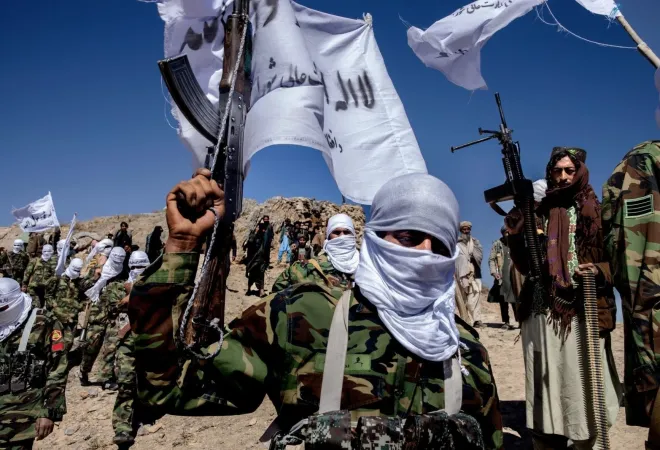-
CENTRES
Progammes & Centres
Location
Two years since the fall of Kabul, the intertwining of multiple crises has only wreaked havoc on the lives of common Afghans

15th August marked two years since the ‘fall of Kabul.’ Despite the pressure, the Islamic Emirate of Afghanistan has persisted with its archaic and extremist governance system, sticking to the template of its first stint in power (1996-2001), vis-a-vis its policies on women and minorities and dashing all hopes and expectations of a reformed Taliban. As countries start engaging with the group and take a more pragmatic approach towards navigating the new regime, apprehensions about the utility of negotiating with the group and the degree of engagement are only rising. With the terror threat still looming large and the conditions inside the country far from stabilised, the common Afghans are still struggling for survival.
In the latest Afghanistan Economic Monitor, the World Bank noted a decrease in headline inflation, an appreciation in the value of the Afghani (AFN), with the currency gaining 3.9 percent against the US dollar between December 2021 and July 2023; and revenue collection totalling 63 billion AFN, with border crossings with Iran and Pakistan contributing 60 percent of the revenue in 2023. But despite these positive offshoots, the welfare of the common Afghans is still in a dismal state. Nearly 29.2 million people need assistance, a significant jump from the 18.4 million people in need when the Taliban regained power in 2021. Further complicating the situation is a massive fall in international aid, with the Humanitarian Response Plan for 2023, worth US$3.23 billion, facing a funding gap of US$2.43 billion. This fall has also forced aid agencies to reduce the number of targeted populations for assistance, from 9 million people at the beginning of 2023 to just 5 million people in May. The foreign exchange reserves of the country’s central bank are still blocked, with the Da Afghanistan Bank (DAB) failing to pass an audit conducted by the United States (US) in March 2023.
As countries start engaging with the group and take a more pragmatic approach towards navigating the new regime, apprehensions about the utility of negotiating with the group and the degree of engagement are only rising.
In tandem with these man-made problems, the country is reeling from the extremes of climate change and other natural disasters. In 2023, approx. 16,700 people were affected by floods, with 40 people dying from flash flooding in July alone. Of the 6.6 million internally displaced people, most are compelled by the vagaries of climate change to leave their homes. Thirty of the 34 provinces are dealing with water problems. While floods and earthquakes have been a frequent occurrence, the intertwining of multiple crises with no apparent solution to resolve any of them has wreaked havoc on common Afghans. As winter approaches, the urgency of disbursing critical supplies before some areas of the country get cut off due to the harsh weather has become extremely important.
In an apparent bid to ameliorate the excessive burden that the groom and his side of the family have to bear because of the pre-wedding salon visit by the bride and her relatives, the Ministry of Vice and Virtue announced the closure of all beauty salons in the country in July. As frivolous as this reasoning sounds, the Taliban have resorted to blatant misogynistic excuses to justify their actions against the rights and freedom of women. Over the last two years, the group has acted incrementally, maybe to gauge the reaction that their slow dismemberment of women’s agency will elicit from the international community. Between September 2021 and May 2023, it passed close to 50 edicts on women alone. These edicts have been all-encompassing—forbidding women from accessing educational institutes, workplaces, places of leisure, and now finally predominantly female-dependent services. The deliberate attempt to bar women from stepping out of the house without any reason, to prevent them from partaking in any form of amusement reflects the deeply embedded desire among the ‘men’ of Taliban to not let women become independent.
As frivolous as this reasoning sounds, the Taliban have resorted to blatant misogynistic excuses to justify their actions against the rights and freedom of women.
While these repressive policies have seen women come out on the streets to protest the Emirate’s policies, the group has cracked down on the protestors with disproportionate force. When the group gained power in August 2021, it suspended the 2004 Constitution and any remaining scaffolding to support and aid the grievances of women. It claimed that all laws were being reviewed to bring them in line with Islamic law. This caveat, ‘within the framework of Islam’, ‘as per Sharia’ has been consistently (mis)used by the group to justify its draconian policies. Any reforms that the Taliban intends to take with regards to education, to streamline it with Islamic and Afghani principles is a “rapid and radical process of Talibanisation, theocratisation and instrumentalisation of higher education in the service of rationalising and strengthening the second emirate.” Between August 2021 and June 2023, apart from women, former government and security officials, prisoners, and journalists were also at the receiving end of the Taliban’s violence, with close to 1,000 recorded incidents.
Since the coming of the Taliban, the (re)emergence and strengthening of terrorist networks inside Afghanistan has been a cause of concern for the international community. While the group committed to cut ties with terrorist networks and to not allow Afghan territory to be used to attack other countries, the killing of Aymen al-Zawahiri, the leader of Al-Qaeda, in a US drone strike in July 2022 dispelled any hope of the Taliban making good on their counter-terrorism commitments. The terror groups in Afghanistan now fall under two categories—Taliban’s allies, namely Al-Qaeda and the Tehreek-i-Taliban (TTP) Pakistan and those opposed to them, namely the Islamic State Khorasan Province (ISKP). Apart from these, many Central Asian terror groups like the East Turkestan Islamic Movement and groups like the Lashkar-e-Taiba (LeT) are also present inside the country.
The group’s propaganda arm has attempted an outreach to anti-Taliban factions to join them, further jeopardising the security situation in the country.
Despite the pushback from Taliban members on the strength of the ISKP, the threat from the group has hardly dissipated. The second year of the Emirate saw an almost 83 percent decline in the number of attacks by the ISKP, with 2023 only seeing a dozen attacks. But, as a report suggests, this fall is not necessarily due to the group’s faltering strength, and the threat is still potent. As per the United Nations Assistance Mission on Afghanistan (UNAMA), since August 2021, IED attacks by the ISKP at places of worship, educational institutes and other public spaces frequented by the minority Shia Hazara communities have led to many civilian deaths. The group’s propaganda arm has attempted an outreach to anti-Taliban factions to join them, further jeopardising the security situation in the country.
Last month, a delegation from the US met the Islamic Emirate of Afghanistan’s Acting Foreign Minister, Amir Khan Muttaqi, along with a few other members in Doha, Qatar for high-level talks aimed at identifying confidence-building measures. The US Special Representative for Afghanistan alluded to the possibility of working with the group on ‘critical issues’ such as economy, human rights concerns, security commitments, inclusive government, and counter-narcotics. No US official has visited Afghanistan since the return of the Taliban; the meeting was significant and follows recent high-level visits by officials from a few countries in Europe.
The US Special Representative for Afghanistan alluded to the possibility of working with the group on ‘critical issues’ such as economy, human rights concerns, security commitments, inclusive government, and counter-narcotics.
The group is also working to expand its diplomatic footprint with outreach to countries in Southeast Asia and interactions with religious leaders from Britain in a bid to gain their support for recognition. But while no country has recognised the regime, many have initiated some sort of conversation with them and the same has been leveraged by the Taliban to project a favourable image underscoring the indispensability of working with them. As per data collected by Aaron Y. Zelin, Senior Fellow, Washington Institute, 35 and 37 countries respectively engaged with the group in the last two years, with the number of engagements with most countries seeing a jump in the second year. While China has maintained constant communication with the group, the group’s engagement with Russia and Iran increased substantially in the second year. Notwithstanding the benefits that these engagements will bring, countries across the spectrum have refused to cross the red line of granting the group recognition- an awkward but acceptable status quo that enables them to work with the group to secure their interests while avoiding the embarrassment of recognising a brutal regime. But for the Taliban, even a semblance of legitimisation is enough to perpetuate their hardcore policies.
Two years later, the group has failed to uphold any of the initial commitments that it made in August 2021 when it took over Kabul. The security situation inside Afghanistan is still volatile, the socio-economic conditions of the people are miserable, and the calls for the formation of an inclusive government are blatantly ignored by the all-male Pashtun-dominated interim administration. While the administration has managed to solidify its rule to an extent and positioned itself in a way that compels the world to work with them in some capacity, it is the common people of Afghanistan who remain caught in the crossfire. Many Afghan women feel that the group is using women as a ‘bargaining chip’, pressurising the international community to recognise the regime. Irrespective of all this, countries will continue to engage with the group to further their interests, whether those interests overlap with what the common people of Afghanistan want is to be seen.
Shivam Shekhawat is a Research Assistant with the Observer Research Foundation
The views expressed above belong to the author(s). ORF research and analyses now available on Telegram! Click here to access our curated content — blogs, longforms and interviews.

Shivam Shekhawat is a Junior Fellow with ORF’s Strategic Studies Programme. Her research focuses primarily on India’s neighbourhood- particularly tracking the security, political and economic ...
Read More +